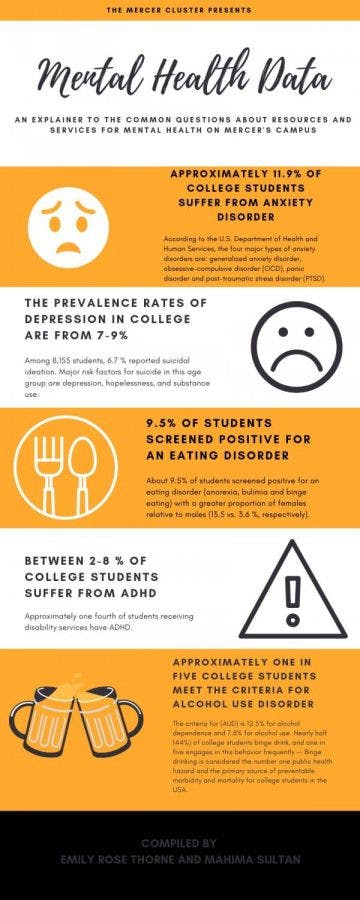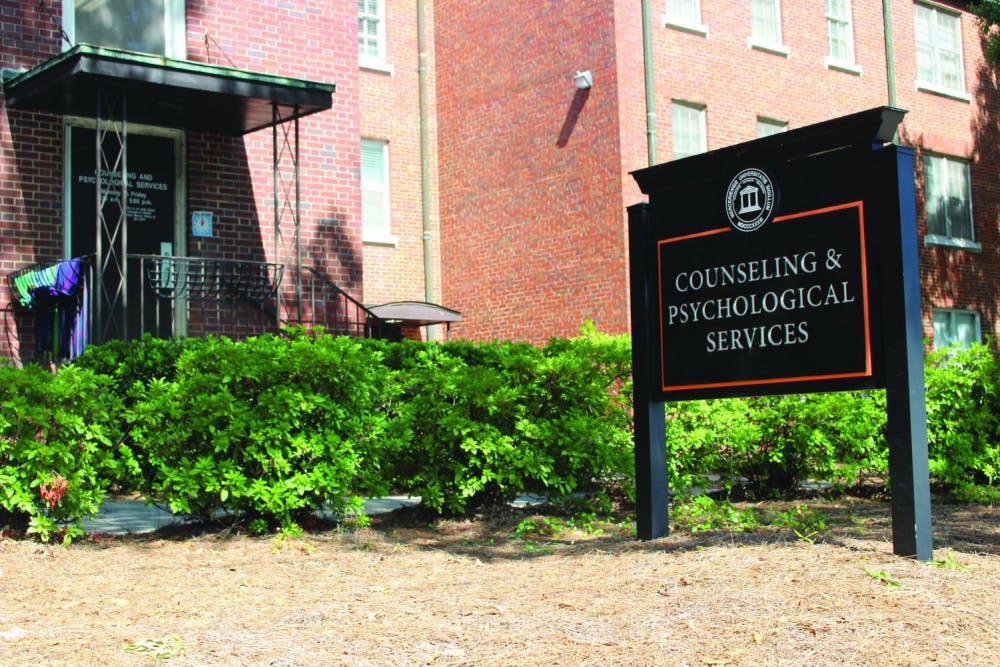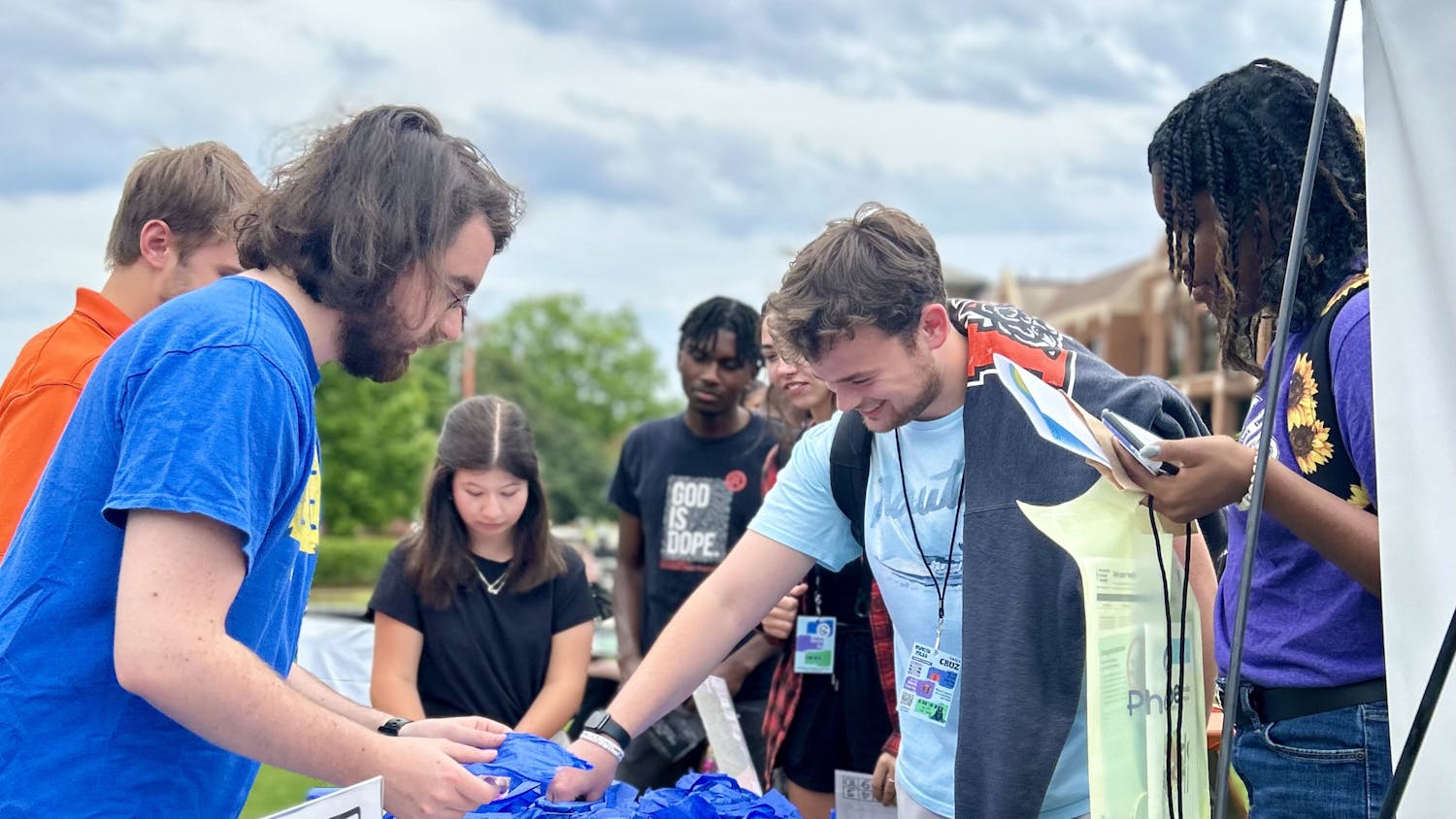[sidebar title="Content Warning" align="left" background="on" border="all" shadow="on"]
This article contains discussions of anxiety, depression, eating disorders, substance abuse and suicide.
[/sidebar]
Rates of mental health problems on college campuses continue to climb, according to a study from November 2018 analyzing trends in students accessing treatment for mental illness from 2007-2017.
This revelation probably isn’t surprising to anyone on Mercer’s campus. Have you ever seen someone cry in the library, skip class due to anxiety or spend a day in bed during a depressive episode? Or have you ever felt guilty for doing one of those things yourself? You’re not alone, and you’re not being dramatic; medical professionals recognize chronic stress in students as a public health issue.
Earlier this year, the National Academies of Sciences, Engineering and Medicine added students at “high-achieving schools” to their list of “at-risk” groups who were likely to experience poor mental health resulting from environmental factors. To put that into perspective, other at-risk groups include children living in poverty, youth in the foster care system, recent immigrants to the United States and kids with parents in prison.
Chronic stress, access to alcohol and drugs, “excessive pressure to succeed” and the stressors associated with a transitionary period of life can contribute to the development of mental illness. A 2015 study in the journal Academic Psychiatry found that substance abuse disorder is the most common problem college students face: 20% develop alcohol abuse disorder, and 22-40% of smokers become dependent on nicotine.
Otherwise, about 12% live with an anxiety disorder, 9.5% with anorexia, bulimia or binge-eating disorder and 7% to 9% with a depressive or mood disorder. Almost 10% report struggling with suicidal ideation, up from less than 6% in 2007, according to the ten-year mental wellness analysis. The study also found that rates of depression in college students increase each year.
Rates of some mental illnesses soar in college because the average age of onset coincides with the age at which traditional students attend an undergraduate program — broadly, between 17-23 years old. However, the data also suggests that college students suffer mental health issues at a disproportionately high rate due to the abundance of additional pressures.
Still, less than half of college students who are suffering will seek treatment. But according to Emily Piassick, director of Counseling and Psychological Services at Mercer University, that number is increasing.

On Mercer’s campus, CAPS has experienced a 36% jump in the number of students seeking counseling since 2016, including undergraduates, graduate students, law students and medical students. That number is consistent with national rates of treatment and diagnosis, which rose from 19% in 2007 to 34% in 2017, Piassick said.
Last year, CAPS treated 534 individual clients with a staff of two professional therapists, one part-time intern and two part-time therapists. The 2019-2020 staff includes two professional therapists, two part-time interns and a new assistant director, who started Oct. 1.
CAPS will continue to search for an additional counselor. Piassick said a larger staff will help the office match the increasing demand for services.
Understaffing is nothing new for CAPS: some students in 2018 reported wait times so long that they gave up on going there. This year, Piassick said that the average wait time is seven days after a student calls to make an appointment. When 94 million Americans have had to wait longer than a week and the average wait time for a graduate student exceeds 10 weeks, a seven-day wait shouldn’t be too much of a deterrent.
Sometimes, though, making it through another week might not feel realistic.
“All students are asked if they are in an emergency situation when they call for an appointment at CAPS,” Piassick said. “If the student says they are in an emergency situation, they will speak directly with the therapist on call to assess the emergency and make decisions for next steps.”
Piassick said the most common concerns students have when coming to CAPS are anxiety, depression, family issues and stress.
C. is a senior at Mercer who suffers from depression and anxiety. He didn’t want to use his full name in this report due to the sensitive nature of his story, but he said he’s been going to CAPS off and on since his freshman year.
“I’ve had a mostly positive experience with CAPS personally. I think that has more to do with who I saw than necessarily the department as a whole,” he said.
His freshman year, C. was able to schedule weekly appointments at CAPS. When he was a sophomore, however, his counselor became overbooked.
“I began to run into times where I wouldn’t be able to see my therapist for two weeks instead of one. Sometimes I would have to wait if she had something come up. She had one time where she had to go back up to Atlanta, so I had an appointment canceled and moved,” C. said.
Eventually, he stopped trying to schedule appointments.
“It was hard getting an appointment, and between that and my increasing mental health issues, I didn’t have the motivation to keep fighting to go back,” he said.
C. didn’t return to CAPS his junior year. He started looking for outside help in Macon, but couldn’t find a practice that his insurance would cover, so he recently returned to CAPS.
“We’re running into the same kind of wait issues, but not as bad. I’m on pretty much a biweekly schedule,” C. said. “I would like to be seeing my therapist on a weekly basis, but I understand that with the influx of students trying to see them, especially since they’ve been trying to improve their reputation, I can’t necessarily expect to see her on a weekly basis.”
Students can make an appointment with CAPS by calling their office at 478-301-2862 or visiting their physical location behind Mary Erin Porter Hall.
For students interested in off-campus services, websites like Psychology Today and Find A Psychologist run databases for users to search by location and insurance provider for verified counselors.
Some local mental health practices include Georgia Behavioral Health Professionals of Macon, which is a branch of a statewide network, and Piedmont Counseling Center. Faith-based therapy options include New Dawn Counseling Center and Crossroads Christian Counseling Center. CAPS can also refer students to external practices, therapists and psychiatrists.
October 10 is World Mental Health Day. Where can Mercer students get help?

The Counseling and Psychological Services office is located behind Mary Erin Porter Hall on Mercer's campus.




